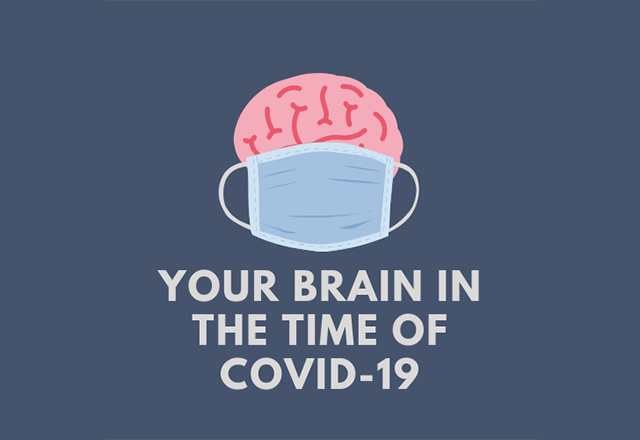During the pandemic, so many of us have been cut off from the activities we find fulfilling and enjoyable, and science communication is no exception. Before the emergence of COVID-19, scientists relied on festivals, school visits and public lectures to disseminate information in an engaging and digestible way, but these in-person events have been curtailed recently to prevent the spread of the virus. Emily Han, a Ph.D. student studying neuroscience at the Johns Hopkins University School of Medicine, found one way to circumvent this problem. Emily teamed up with her friend Gayathri Karthik, a Ph.D. student at Duke-National University of Singapore Medical School, to start a podcast focused on the psychological impact of the pandemic. The program, called Your Brain in the Time of COVID-19, explores how we can apply what scientists have learned about the brain to understand our own experiences during this historic upheaval of our day-to-day life. The podcast launched in May 2020 and is now finishing up its first season. Each episode focuses on a different theme; so far, anxiety, loneliness, grief, altruism and memory have been covered.
One challenge in science communication is conveying the relevance of scientific findings to a broad audience — in other words, answering the question: Why should I care? This podcast engrosses the listener from the get-go by using science to understand what is happening to our own bodies and minds during a tumultuous time. “Back in early March 2020, I had a lot of anxiety because I grew up in China, and the pandemic hit there a little earlier than the rest of the world,” Emily explained. “It was a very confusing mix of emotions I had to navigate through. Then when the pandemic also hit the rest of the world, I saw that other people also experienced similar emotions. Gaya and I were chatting and we thought, what if we create a podcast to talk about these emotions?” Emily hopes that understanding the basis of these feelings could bring comfort to listeners. “For example,” she explains, “learning about the course of an immune response made me feel more in control, and more at peace with my body when I feel sick. ‘OK, this fever is very uncomfortable, but it’s my body’s effort to kill the pathogens.’”
In fact, Emily and Gaya’s episode on loneliness helped me process my own reaction to long periods of time spent at home. The pair discussed how human relationships would have been advantageous for survival throughout evolutionary history; consequently, loneliness has become an innately painful feeling that drives us to seek out companionship. Social activities, they explained, trigger dopamine release in the brain — a response that is very similar to the brain’s reaction to other rewarding stimuli that are essential for survival, such as food. Simply classifying social interaction as a need akin to hunger or thirst, rather than a pastime, persuaded me to set aside more time to connect with friends either virtually or in safer outdoor settings. The episode also clarified why the social situations we normally crave may seem more daunting after long periods of isolation. Gaya explained that chronic loneliness can be perceived as a lack of safety, and is thought to trigger a state of hypervigilance in the brain. “When we’re feeling lonely, we perceive the social world to be a lot more threatening, and then we start expecting more negative social experience,” she elaborated. All the more reason to be patient with ourselves as we reacclimate to social settings when the pandemic ebbs.
Being an audience to this podcast feels like listening in on a conversation between friends, but hours of research, planning, writing, fact-checking and editing underpin each episode. The hard work seems well worth it to create an educational resource that can be accessed for free, and is unconstrained by distance or border lines. “The best part is to see people around the world listening to it, and receiving it well,” Emily said. “We were so nervous when we promoted it on Facebook and Reddit, because we have always thought there are a lot of mean people on the internet. But we got a lot of very warm and enthusiastic responses from strangers. …They live in faraway countries we’ve never traveled to. It was really surreal for us. … We probably would not have crossed paths with these people in real life. Yet to think our voice had reached them, and our experiences and emotions resonated with theirs, is quite heartwarming.”
Find the podcast on Apple Podcasts.
Related content
- Johns Hopkins Medical Students Create Campaign to Confront COVID-19 Rumors with Facts
- Psychiatric Perspectives in an Era of COVID-19
- Hopkins Biotech Podcast — Why Leave Career Fulfillment Up to Chance?
Want to read more from the Johns Hopkins School of Medicine? Subscribe to the Biomedical Odyssey blog and receive new posts directly in your inbox.
